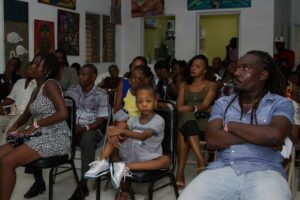Engaged Anthropology Grant: Chelsey Kivland

Chelsey Kivland is Assistant Professor of Anthropology at Dartmouth College. In 2008, while a doctoral student at the University of Chicago, she received a Dissertation Fieldwork Grant to aid research on ‘Of Bands and Soldiers: Performance, Sovereignty, and Violence in Contemporary Haiti,’ supervised by Dr. Stephan Palmie. In 2014, she received the Engaged Anthropology Grant to aid engaged activities on ‘Slam Tambou: Building a Peace Movement through Poetry and Performance,’ 2015, Haiti.
The Haitian term angaje issues a stronger meaning than the English engaged. Its referent moves beyond becoming involved or participating to suggest moral judgment and political commitment—in short, taking a stance. To meet the Haitian standard for engaged anthropology, then, is to embrace what Nancy Scheper-‐Hughes calls “militant anthropology.” This entails a turn away from politically disinterested and socially distanced research. A militant ethnographer would make herself “available not just as friends or as ‘patrons’ in the old colonialist sense but as comrades (with all the demands and responsibilities that this word implies) to the people who are the subjects of our writings, whose lives and miseries provide us with a livelihood.” A first step in this process is to share your findings with your collaborators in the field. A second, more difficult step is to be open to the changes in analysis that this sharing might entail. And a third, even more challenging step is to join in the struggle to usurp the detrimental power dynamics revealed in the analysis.
It was toward this end that I returned this past summer to Port-‐au-‐Prince to diskite (discuss)—to share, debate, and revise—the findings of my dissertation research, “We Make the State”: Performance, Politick, and Respect in Urban Haiti. Much of my research has explored the urban youth groups—known locally as baz—that act as de facto political chiefs of their urban blocks. The baz are often dismissed as “gangs” in policy and media literature in Haiti and abroad. Yet, as I argue, they are better understood as an emergent form of democratic politics that seeks to provide political representation and control over public resources for an area that has been both neglected by state institutions and targeted by politicians and aid workers alike as the ticket to political success. Despite their noble aspirations, however, bazes become involved in competitions over state and NGO resources, which incite rivalries between them and often lead to violent conflict. A main contribution of my research has been to reveal how this violence is related to the contradictions of democracy—namely, how democratization promised a more egalitarian society and inclusion in the state but has instead lead to greater inequality and the evisceration of the public sector. While my collaborators in Bel Air might not phrase it in these terms, they often identified the same dynamics in their discussions about disrespect. In Haiti, the notion of “respect” (respè) is the social value used to gauge proper human relations and democratic society. My commitment to articulating my analysis through the idioms and sentiments used by informants is the goal of my research, and it formed the cornerstone of my engaged anthropology grant project.

I organized a two-‐part presentation of my research at a newly opened cultural center in Bel Air. The first part of the series was a lecture in which I revealed my novel finding that acts of baz aggression are tied to the multifaceted ways in which disrespect is made manifest in the lives of the urban poor, as well as how peace can be envisioned as a world imbued with respect. In particular, I offered four key forms of disrespect that precipitate baz violence: disparaging authority, injuring another, leveling threats, and accumulating wealth in a dishonest or selfish manner. I then illustrated how all of these precipitants reflect failure to uphold the principle of respect, which encompasses the right to be recognized as a consequential subject, to lead a dignified life, to speak and be heard, and to live in an egalitarian society. The lecture unfolded amid long awaited parliamentary elections, which resulted in clashes between residents, politicians, and poll workers at voting offices throughout the neighborhood. Consequently, much of the conversation revolved around the interconnections between politics and violence, and the perpetual frustrations baz face when they are treated as pawns in the fight for state power. In fact, a novel point raised during the conversations was that being treated with disrespect over and over again can lead to powerful feelings of frustrations that motivate aggressive actions against those deemed responsible, whether political or personal rivals. Overall, participants reiterated their need and desire for less politicking and more governance, or in other words, a robust and responsible state that provides basic services and a degree of opportunity to the citizenry. This was a response I have grown accustomed to hearing, but it was particularly powerful in the context of chaotic elections, proclaiming enduring aspirations for a truly democratic future.
The second part of the series featured a multimedia presentation of residents’ ideas about how to build a more peaceful society. It centered on showing a film I directed with Haitian filmmaker Moïse Pierre about the annual fête patronale Festival of Our lady of Perpetual Help. The film demonstrated how despite a history of political conflict and interpersonal strife all factions of the neighborhood come together to celebrate the “Mother of Bel Air.” Those who represented these different sectors in the film were in the audience, including religious leaders from different faiths, area leaders of different baz, and notables working in the education, development, and political sectors. Another seventy-‐five residents joined as well, forming a diverse public of men and women, children and adults, employed and unemployed, politicians and citizens. The film showing was accompanied by a poetry slam that featured four youth poets rhyming about the challenges of building peace and security in a highly unequal world. As well, two local rara groups, the name for Haiti’s politicized street bands, entertained the audience, before, during, and after the slam. The rara groups, one comprising all women and the other all men, provided an electric beat, bringing the audience to its feet and inciting people of different faiths, ages, and political persuasions to commune together in celebration.
The film was well received, with audiences commenting on how it offered another image of the neighborhood from commonplace portrayals of violence and dysfunction. Still, others appreciated how it put the problems that do exist in context so that the actions of residents, and especially baz leaders, are seen as tied to daily struggles of poverty, frustration, and disrespect. The conversations started at the showing continued well after the event. When I finally returned to the hilltop shack where I have made a second home, I found a moving scene. My longtime host had borrowed the baz’s collective television set and was showing the film on it for area children and others who missed the earlier showing. It ran on an endless loop far into the night, with new residents joining at each showing and others watching it over and over again. Amid the celebration, I visited a local “notable” who figured largely in the film. A longtime resident, neighborhood leader, and former teacher, whom residents affectionately address as Mèt, he complimented me on the event, and offered some criticism. The event, he said, would have benefited from more discussion of the historical connection between art and politics in the zone. The point was well taken.
But he then told me that he was very pleased, mainly because I had come to understand something fundamental to Bel Air. As he put it, “Bel Air is place few people understand. But that if you spend time here, with people in the street, you can begin to see that it is not what people think. Li pa yon zòn bandi se yon zòn rabel. (It is not a zone of bandits but a zone of rebels.) That’s a big difference!”
This pithy comment reminded me again of how a truly angaje anthropology is to present your research to your interlocutors in formats that are accessible so as to foster rigorous, opinion-‐changing debate.